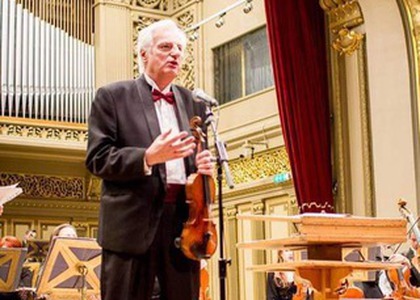> [Archived] Interviews

Interview with dr. Mircea Penescu
On December 10th, the Bucharest National Opera hosts the "Harmonies of Hope" charity concert, supported by the Doctor Ermil Nichifor Orchestra.
Invited directly via phone call to the morning radio is Prof. Dr. Mircea Penescu, head of clinic at the Dr. Carol Davila Nephrology Hospital in Bucharest and concert-master of the Dr. Ermil Nichifor Medics' Orchestra, to give us details about the charity concert which the ensemble presents on Saturday evening at the Bucharest National Opera.
We are aware that this is not the first time you've held a charity concert. The 10th December's event is organized in support of cancer patients in Romania. Please tell us more about this idea.
Yes, indeed, there is a suite of concerts in the last month, four ample ones that the doctor's orchestra performs. We have already reached the second half of these performances. We started on November 14th with a concert for World Diabetes Day, then it was the "Harmonies of hope" concert. Also, there was a charity concert, for the benefit of patients with neoplasias, "The joy of healing", a very meaningful title. Next is "Harmonies of hope" and we will finish with a concert dedicated to Christmas and New Year. Saturday's concert at the Romanian Opera House is a large-scale concert, a charity concert that aims, first of all, to highlight the launch of the national program for fighting cancer. It's about drawing attention to the importance of this devastating disease which every year makes about 100.000 victims in Romania, of which 50.000 don't stand a chance. The concert represents the signal to be raised in this regard and secondly, it's about doing something for this category of patients who, indeed, are under very difficult treatments and which endures them with great discomfort and who also need hope, harmony and civic support. It is a warning-like concert on the one hand, and on the other, a charity concert, in the sense that a whole group of institutions or charitable associations were ready to help in the benefit of these patients. Of course it is a drop in the bucket, because the needs are great, huge even, but still the gesture and symbolism of this event are very special.
From what I understood, a special fund is being set up to collect the donations you are telling us about.
There is a fund where all the money is collected and will be directly sent for certain patients' treatment, for treatments that are not fully insured by the state.
You were telling us about the title of the concert, a very suggestive one, "Harmonies of Hope". Who are the guests who will perform at this event?
The concert has a sui generis structure. It starts with Christmas carols, because we're close to the holiday period, the protagonists are the two choirs of the George Enescu Philharmonic led by the maestro Iosif Ion Prunner, who is also the conductor of the Medics' Orchestra and reunited with the choir of the Romanian Opera under conductor Daniel Jinga's baton. On this occasion, the two merged choirs will inaugurate on stage the Romanian Opera, the Romanian National Choir, a title that holds a great impact and that I hope will represent us with great success at a level of extraordinary musical demands and in meaning.
Then we have a more special block, more exactly film music. We have a guest from the UK, Sir. Willard White, who is a bass-baritone of extraordinary quality, well known in the West, ennobled by the Queen, alongside our tenor Daniel Magdal, also a great Romanian musician, well-known abroad. They will be accompanied on the piano by Cristian Niculescu, who is the director of the Romanian Cultural Institute in Berlin. So that's just to talk about the great musicians who accepted to offer this concert, let's say, a quite special touch of excellence. And also there is the program that reminds us of the holidays, Strauss's famous waltzes, polkas. It is, therefore, a whole unfolding of forces, the choirs gathered together with the very large orchestra, alongside these special soloists. I hope it will be a festive evening, which will bring light into these people's souls who are in a very difficult battle. I hope it will bring hope and to bring to the dissonant and disharmonious and strident Romanian society harmonies of hope, because nothing can be done without it, not even in medicine, and, obviously music which by definition means harmony.
Exactly. Thank you so much, professor, for your telephonic presence in our radio morning. We wish you great success and congratulations on this beautiful initiative.
Thank you on behalf of the orchestra.
Translated by Ioana Negrea,
University of Bucharest, Faculty of Foreign Languages and Literatures, MTTLC, year II
Corrected by Silvia Petrescu














